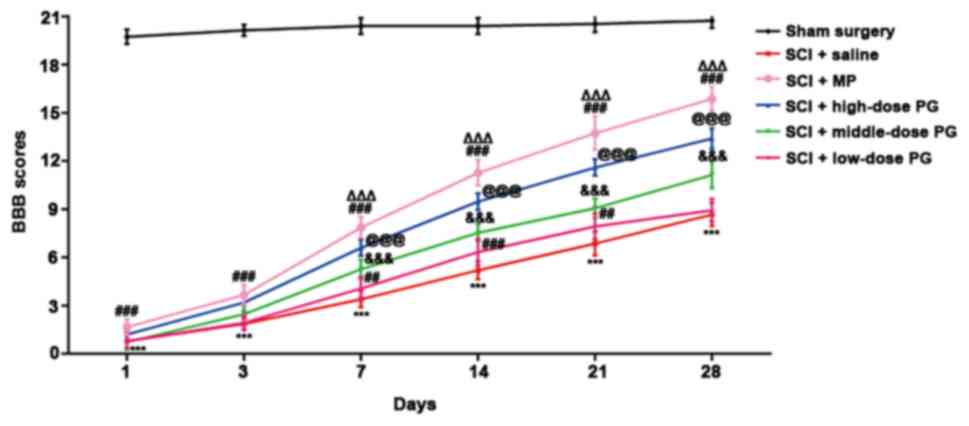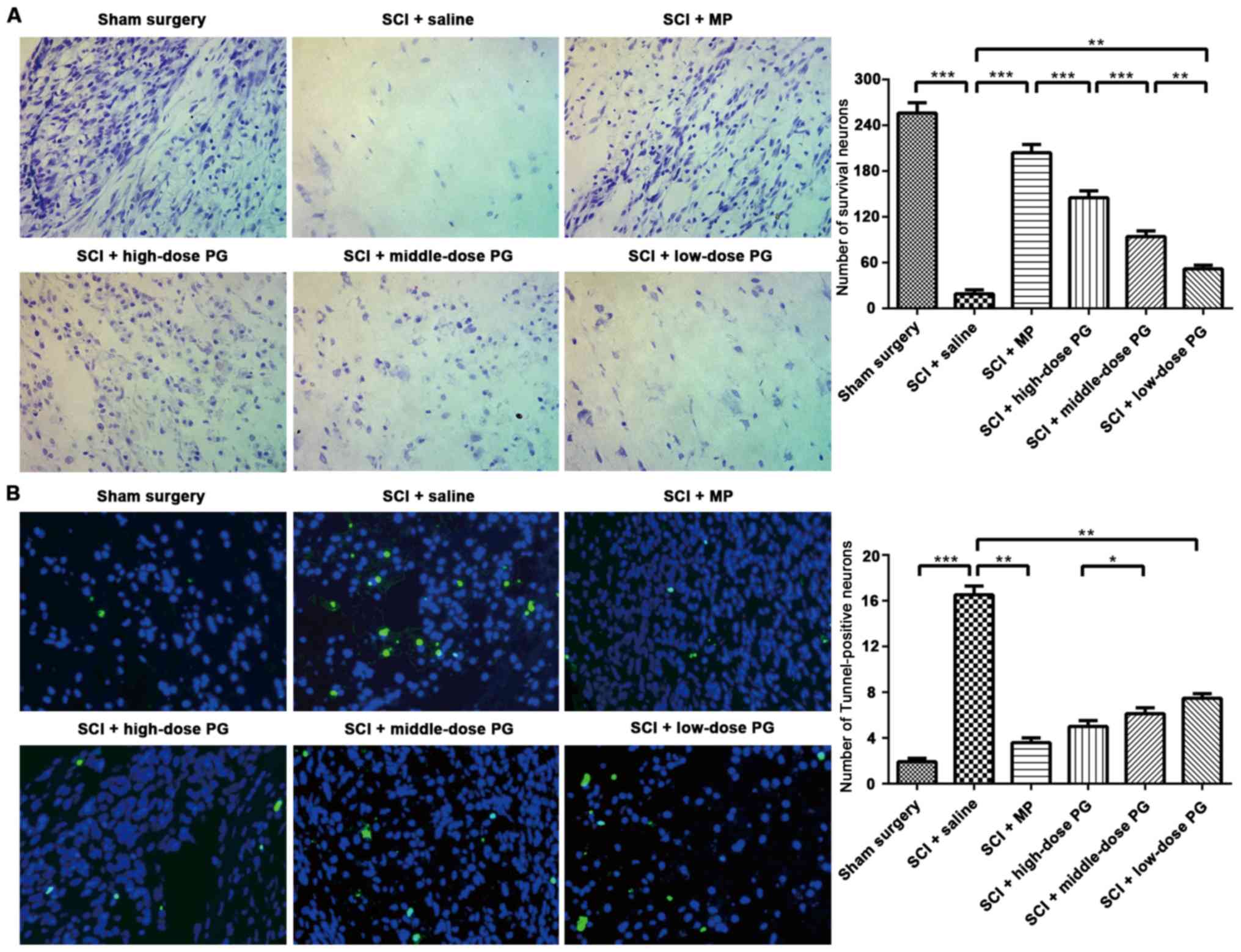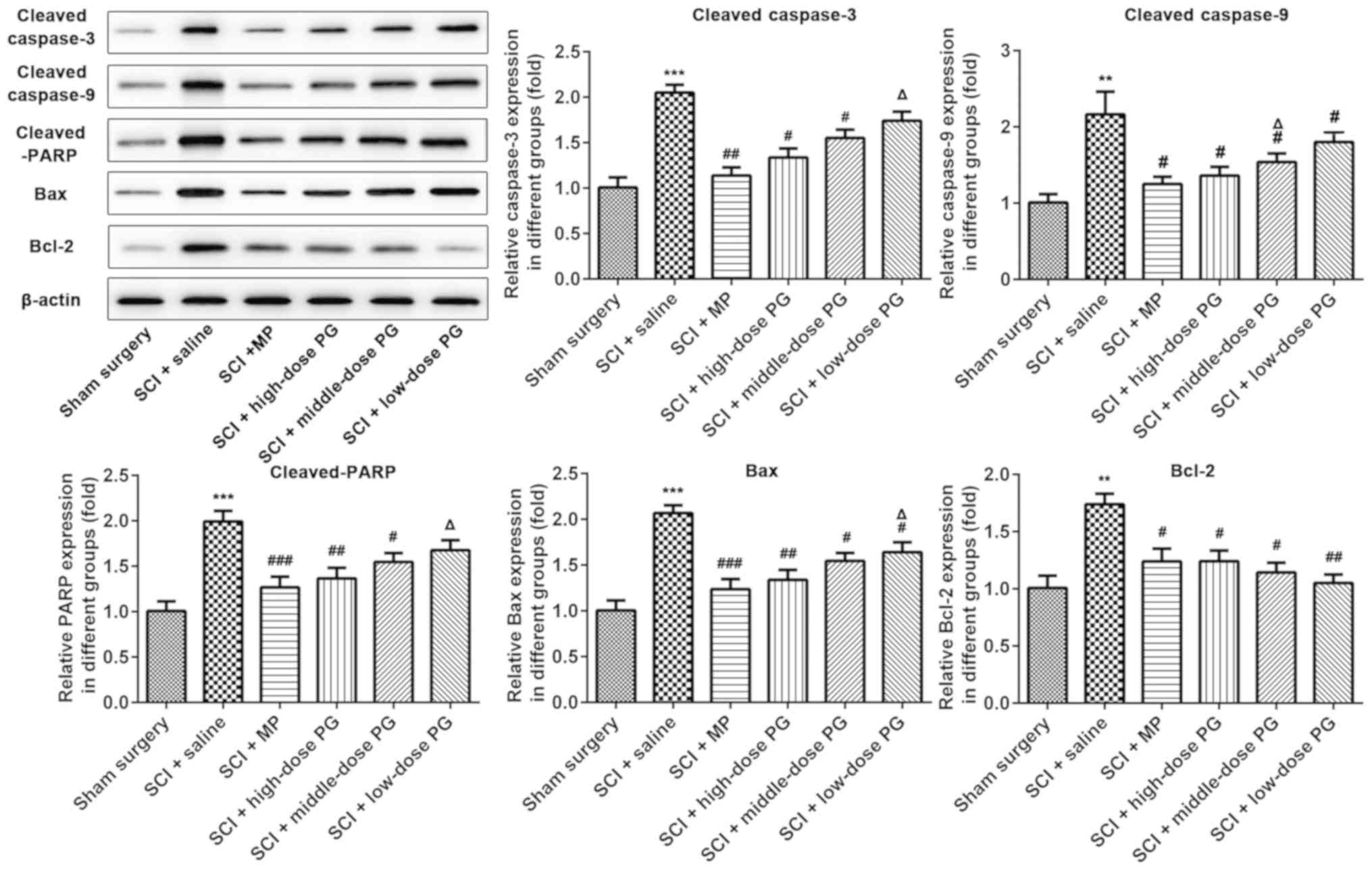|
1
|
Calancie B, Molano MR and Broton JG:
Epidemiology and demography of acute spinal cord injury in a large
urban setting. J Spinal Cord Med. 28:92–96. 2005. View Article : Google Scholar : PubMed/NCBI
|
|
2
|
Fox IK, Davidge KM, Novak CB, Hoben G,
Kahn LC, Juknis N, Ruvinskaya R and Mackinnon SE: Nerve transfers
to restore upper extremity function in cervical spinal cord injury:
Update and preliminary outcomes. Plast Reconstr Surg. 136:780–792.
2015. View Article : Google Scholar : PubMed/NCBI
|
|
3
|
Moulin P, Gohritz A and Meunzel J: Spinal
cord injury: Still an interdisciplinary challenge [corrected].
Orthopade. 43:625–635. 2014.(In German). View Article : Google Scholar : PubMed/NCBI
|
|
4
|
Choi DW and Rothman SM: The role of
glutamate neurotoxicity in hypoxic-ischemic neuronal death. Annu
Rev Neurosci. 13:171–182. 1990. View Article : Google Scholar : PubMed/NCBI
|
|
5
|
Fehlings MG and Nguyen DH: Immunoglobulin
G: A potential treatment to attenuate neuroinflammation following
spinal cord injury. J Clin Immunol. 30 (Suppl 1):S109–S112. 2010.
View Article : Google Scholar : PubMed/NCBI
|
|
6
|
Song Y, Zeng Z, Jin C, Zhang J, Ding B and
Zhang F: Protective effect of ginkgolide B against acute spinal
cord injury in rats and its correlation with the Jak/STAT signaling
pathway. Neurochem Res. 38:610–619. 2013. View Article : Google Scholar : PubMed/NCBI
|
|
7
|
Bareyre FM and Schwab ME: Inflammation,
degeneration and regeneration in the injured spinal cord: Insights
from DNA microarrays. Trends Neurosci. 26:555–563. 2003. View Article : Google Scholar : PubMed/NCBI
|
|
8
|
Liu C, Shi Z, Fan L, Zhang C, Wang K and
Wang B: Resveratrol improves neuron protection and functional
recovery in rat model of spinal cord injury. Brain Res.
1374:100–109. 2011. View Article : Google Scholar : PubMed/NCBI
|
|
9
|
Shalini S, Dorstyn L, Dawar S and Kumar S:
Old, new and emerging functions of caspases. Cell Death Differ.
22:526–539. 2015. View Article : Google Scholar : PubMed/NCBI
|
|
10
|
Slee EA, Adrain C and Martin SJ:
Executioner caspase-3, −6, and −7 perform distinct, non-redundant
roles during the demolition phase of apoptosis. J Biol Chem.
276:7320–7326. 2001. View Article : Google Scholar : PubMed/NCBI
|
|
11
|
Cory S and Adams JM: The Bcl2 family:
Regulators of the cellular life-or-death switch. Nat Rev Cancer.
2:647–656. 2002. View
Article : Google Scholar : PubMed/NCBI
|
|
12
|
Meijles DN and Pagano PJ: Nox and
inflammation in the vascular adventitia. Hypertension. 67:14–19.
2016. View Article : Google Scholar : PubMed/NCBI
|
|
13
|
Fehlings MG, Wilson JR and Cho N:
Methylprednisolone for the treatment of acute spinal cord injury:
Counterpoint. Neurosurgery. 61 (Suppl 1):S36–S42. 2014. View Article : Google Scholar
|
|
14
|
Samano C, Kaur J and Nistri A: A study of
methylprednisolone neuroprotection against acute injury to the rat
spinal cord in vitro. Neuroscience. 315:136–149. 2016. View Article : Google Scholar : PubMed/NCBI
|
|
15
|
Lim H, Son KH, Chang HW, Bae K, Kang SS
and Kim HP: Anti-inflammatory activity of pectolinarigenin and
pectolinarin isolated from Cirsium chanroenicum. Biol Pharm Bull.
31:2063–2067. 2008. View Article : Google Scholar : PubMed/NCBI
|
|
16
|
Lee S, Lee DH, Kim JC, Um BH, Sung SH,
Jeong LS, Kim YK and Kim SN: Pectolinarigenin, an aglycone of
pectolinarin, has more potent inhibitory activities on
melanogenesis than pectolinarin. Biochem Biophys Res Commun.
493:765–772. 2017. View Article : Google Scholar : PubMed/NCBI
|
|
17
|
Perot PL Jr, Lee WA, Hsu CY, Hogan EL, Cox
RD and Gross AJ: Therapeutic model for experimental spinal cord
injury in the rat: I. Mortality and motor deficit. Cent Nerv Syst
Trauma. 4:149–159. 1987. View Article : Google Scholar : PubMed/NCBI
|
|
18
|
Priestley JV, Michael-Titus AT and
Tetzlaff W: Limiting spinal cord injury by pharmacological
intervention. Handb Clin Neurol. 109:463–484. 2012. View Article : Google Scholar : PubMed/NCBI
|
|
19
|
Basso DM, Beattie MS and Bresnahan JC: A
sensitive and reliable locomotor rating scale for open field
testing in rats. J Neurotrauma. 12:1–21. 1995. View Article : Google Scholar : PubMed/NCBI
|
|
20
|
Stampas A and Tansey KE: Spinal cord
injury medicine and rehabilitation. Semin Neurol. 34:524–533. 2014.
View Article : Google Scholar : PubMed/NCBI
|
|
21
|
Quinzaños-Fresnedo J and Sahagun-Olmos RC:
Micro RNA and its role in the pathophysiology of spinal cord
injury-a further step towards neuroregenerative medicine. Cir Cir.
83:442–447. 2015.(In Spanish). PubMed/NCBI
|
|
22
|
Haller J, Bice M and Lawrence B: Mediating
the secondary effects of spinal cord injury through optimization of
key physiologic parameters. J Am Acad Orthop Surg. 24:160–171.
2016. View Article : Google Scholar : PubMed/NCBI
|
|
23
|
Cai W and Shen WD: Anti-apoptotic
mechanisms of acupuncture in neurological diseases: A review. Am J
Chin Med. 46:515–535. 2018. View Article : Google Scholar : PubMed/NCBI
|
|
24
|
Oyinbo CA: Secondary injury mechanisms in
traumatic spinal cord injury: A nugget of this multiply cascade.
Acta Neurobiol Exp (Wars). 71:281–299. 2011.PubMed/NCBI
|
|
25
|
Mattson MP: Apoptosis in neurodegenerative
disorders. Nat Rev Mol Cell Biol. 1:120–129. 2000. View Article : Google Scholar : PubMed/NCBI
|
|
26
|
Sunshine JE, Dagal A, Burns SP, Bransford
RJ, Zhang F, Newman SF, Nair BG and Sharar SR: Methylprednisolone
therapy in acute traumatic spinal cord injury: Analysis of a
regional spinal cord model systems database. Anesth Analg.
124:1200–1205. 2017. View Article : Google Scholar : PubMed/NCBI
|
|
27
|
Wilson JR, Jaja BNR, Kwon BK, Guest JD,
Harrop JS, Aarabi B, Shaffrey CI, Badhiwala JH, Toups EG, Grossman
RG and Fehlings MG: Natural history, predictors of outcome, and
effects of treatment in thoracic spinal cord injury: A Multi-center
cohort study from the North American Clinical Trials Network. J
Neurotrauma. 35:2554–2560. 2018. View Article : Google Scholar : PubMed/NCBI
|
|
28
|
Karsy M and Hawryluk G: Pharmacologic
management of acute spinal cord injury. Neurosurg Clin N Am.
28:49–62. 2017. View Article : Google Scholar : PubMed/NCBI
|
|
29
|
Zhang T, Li S, Li J, Yin F, Hua Y, Wang Z,
Lin B, Wang H, Zou D, Zhou Z, et al: Natural product
pectolinarigenin inhibits osteosarcoma growth and metastasis via
SHP-1-mediated STAT3 signaling inhibition. Cell Death Dis.
7:e24212016. View Article : Google Scholar : PubMed/NCBI
|
|
30
|
Zhang T, Li S, Li J, Yin F, Hua Y, Wang Z,
Lin B, Wang H, Zou D, Zhou Z, et al: Correction to: Natural product
pectolinarigenin inhibits osteosarcoma growth and metastasis via
SHP-1-mediated STAT3 signaling inhibition. Cell Death Dis.
9:9022018. View Article : Google Scholar : PubMed/NCBI
|
|
31
|
Lee HJ, Venkatarame Gowda Saralamma V, Kim
SM, Ha SE, Raha S, Lee WS, Kim EH, Lee SJ, Heo JD and Kim GS:
Pectolinarigenin induced cell cycle arrest, autophagy, and
apoptosis in gastric cancer cell via PI3K/AKT/mTOR signaling
pathway. Nutrients. 10(pii): E10432018. View Article : Google Scholar : PubMed/NCBI
|
|
32
|
Wang C, Cheng Y, Liu H, Xu Y, Peng H, Lang
J, Liao J, Liu H, Liu H and Fan J: Pectolinarigenin suppresses the
tumor growth in nasopharyngeal carcinoma. Cell Physiol Biochem.
39:1795–803. 2016. View Article : Google Scholar : PubMed/NCBI
|
|
33
|
Csupor D, Widowitz U, Blazsó G,
Laczkó-Zöld E, Tatsimo JS, Balogh A, Boros K, Dankó B, Bauer R and
Hohmann J: Anti-inflammatory activities of eleven Centaurea species
occurring in the Carpathian Basin. Phytother Res. 27:540–544. 2013.
View Article : Google Scholar : PubMed/NCBI
|
|
34
|
Gal P, Kravcuková P, Mokry M and Kluchová
D: Chemokines as possible targets in modulation of the secondary
damage after acute spinal cord injury: A review. Cell Mol
Neurobiol. 29:1025–1035. 2009. View Article : Google Scholar : PubMed/NCBI
|
|
35
|
Cristante AF, Barros Filho TE, Marcon RM,
Letaif OB and Rocha ID: Therapeutic approaches for spinal cord
injury. Clinics. 67:1219–1224. 2012. View Article : Google Scholar : PubMed/NCBI
|
|
36
|
Song Y, Xue H, Liu TT, Liu JM and Chen D:
Rapamycin plays a neuroprotective effect after spinal cord injury
via anti-inflammatory effects. J Biochem Mol Toxicol. 29:29–34.
2015. View Article : Google Scholar : PubMed/NCBI
|
|
37
|
Wang YT, Lu XM, Chen KT, Shu YH and Qiu
CH: Immunotherapy strategies for spinal cord injury. Curr Pharm
Biotechnol. 16:492–505. 2015. View Article : Google Scholar : PubMed/NCBI
|

















